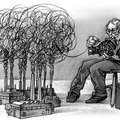Credit markets and the crisis of confidence in global finance
| |
 | |
THE old-fashioned financial system was like Old Maid, a parlour game once beloved of small children. The banks were like players, dealt hands from a pack of cards, which they swapped among each other. At the end, one player was left holding a lonely queen—a bad debt, if you will—and lost. Over the past few decades the game has changed. Securitisation has snipped the old maid into pieces; new faces, such as hedge funds, have joined the party, enabling the banks to distribute those pieces among a larger number of players. When the game is over, lots of players are left holding small losses instead of one player holding a big one.
During two exceedingly prosperous decades, that theory seemed to work just fine. But the swings in almost all financial markets this month have made dispersed risk suddenly morph into dispersed mistrust. The uncertainty has been magnified by the way that bad risks have become so hard to value. Investors have bought asset-backed securities that use shaky subprime mortgages in America as collateral, but as defaults have risen, the value of that collateral has tumbled.
Meanwhile, collateralised-debt obligations (CDOs), made up of clumps of those securities and laced with leverage, have become almost impossible to trade. So none of the players really knows how much he has lost. While this uncertainty lasts, investors are taking it out on the banks that peddled the securities by dumping their shares; and the banks are taking it out on those they sold them to by demanding more collateral on their loans. The banks have even grown cagey about lending to each other.
The doubts burst into the open on August 9th when central banks were forced to inject liquidity into the overnight money markets because banks were charging punitive rates to lend to each other. At first, the problems appeared more serious among European banks. The pain in America was concentrated in the largest hedge funds, including those run by Wall Street’s biggest name, Goldman Sachs. Increasingly, however, analysts worry about the exposure of American, Canadian and Asian banks.
On Wednesday August 15th shares in Countrywide Financial, a large American mortgage lender, fell 13% after an analyst gave warning of possible funding difficulties. Despite liquidity injections by the Federal Reserve on August 15th, the S&P 500 index fell 1.4%. The heavy selling spread to Asian and European stocks on August 16th.
Every crisis begets finger-pointing, and the blame now is falling on the rating agencies that helped structure these exotic instruments. Currently, they are guided by a voluntary code that aims to tackle potential conflicts of interest. The biggest is that the agencies are paid by the firms they rate. Rating CDOs was a profitable business.
If these securities are now downgraded, banks could be forced to offload lots of illiquid instruments into a falling market—one of the fastest ways to lose money yet devised. But if there are no buyers, banks may have to sell something else to shore up their balance sheets.
Something like this indiscriminate selling has been affecting hedge funds over the past couple of weeks. Faced with more demanding standards from their banks and investors, some have been forced to unwind positions in order to realise cash. That has led to unusual movements in debt and equity markets, which have only got some funds deeper into trouble. Quantitative funds have been hardest hit, as investment models that had made money for ages briefly proved worse than useless.
Since banks lend to hedge funds, any problems there quickly become their concern. On top of this, both Bear Stearns and Goldman Sachs have found that when funds bearing their name get into trouble the desire to preserve their reputations soon leads to a rescue. Sometimes risk is not as far away from the banks as it seems.
At the end of Old Maid as banks used to play it, the loser would take a big write-off and then everyone could start playing again. In the new version, the use of leverage means the game is being played with hundreds of packs of cards and by thousands of different players. Working out who has won and who has lost in this round will take a long time.




